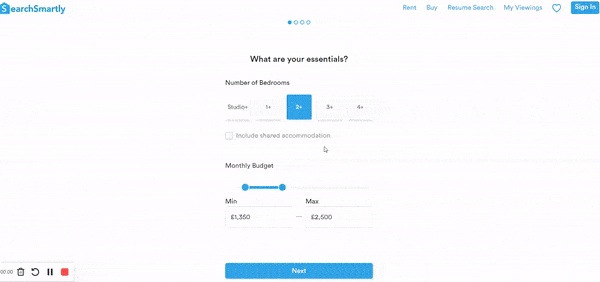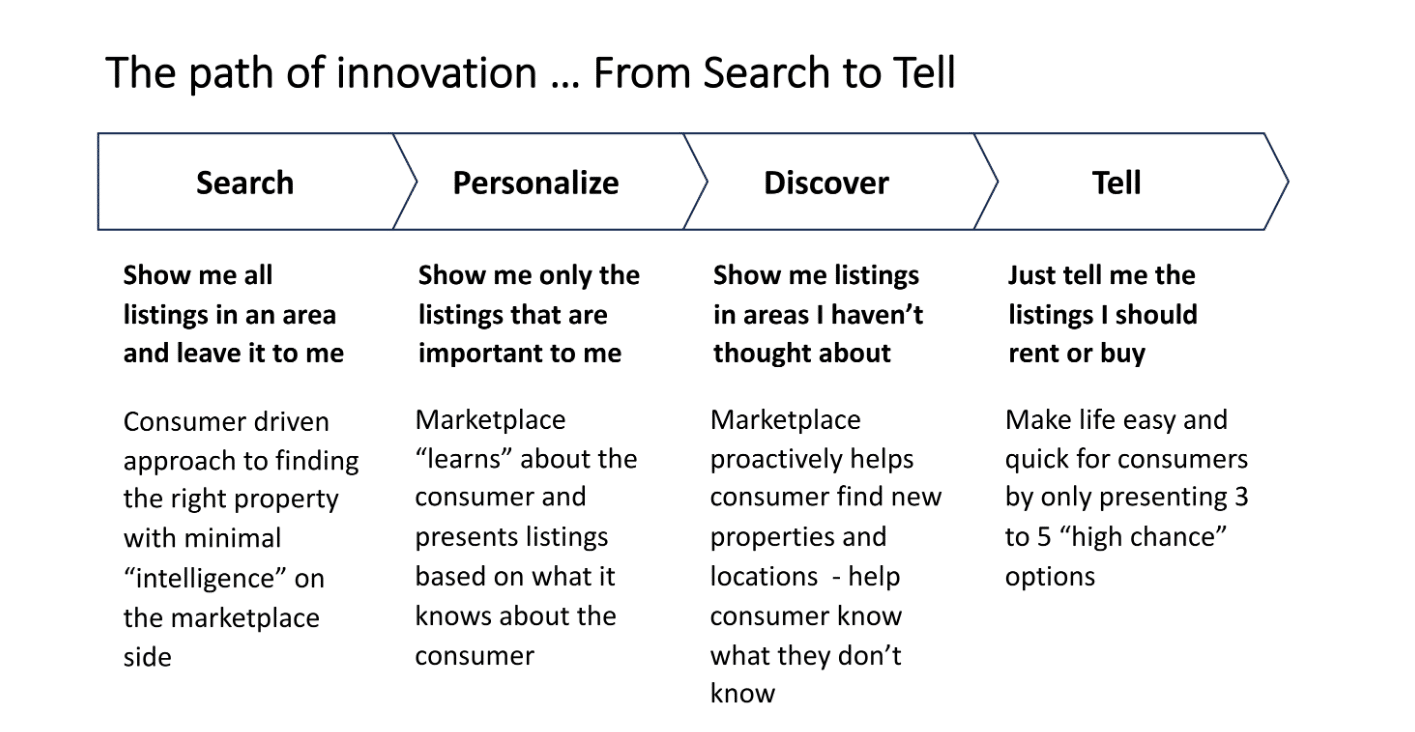
The Property Portal Watch conferences are where real estate portals discuss and sometimes catch a glimpse of their future.
Recent editions have seen industry experts and leaders talk about how AI is going to influence the very first stage of moving house—the search.
With the technology having exploded in terms of capability and adoption in 2023 thanks to the likes of OpenAI's ChatGPT it's no wonder that those at the forefront of the industry are giddy with all the possibilities.
Looking back over the presentations from the Property Portal Watch conference held in Madrid in October and having recently looked through over 700 real estate marketplace sites for the Portal Standards study it seems that visions of future home searches can be put into four categories.
Two of them are already here, adopted by forward-thinking marketplaces while the other two are mostly still in the heads of industry soothsayers and ambitious Product Managers.
Below: The author discusses the future of search with former REA Group CEO, Simon Baker.
Most marketplaces these days ask their users to log in. One reason for this is to enable them to collect useful behavioural data from the people looking through their listings.
Building a picture of each user and tailoring content to them is increasingly important in the e-commerce and marketplace industry.
A user who clicks on the filter to see apartments with a balcony clearly has a preference and will be shown listings with balconies the next time they log in. If they see more listings they like, they are more likely to come back and eventually convert.
Now though, thanks to AI, real estate marketplaces can infer preferences without users explicitly clicking filters. The user might have spent longer looking at properties that have garages and naturally well-lit kitchens. Marketplaces can identify these features in their own listings, put two and two together and deliver each user a personalized feed of listings matching their preferences without a filter even being clicked.
The likes of Australian market leader REA Group and Southeast Asian portal group PropertyGuru have announced that they are using this technique to improve their user experiences and no doubt other big portal companies around the world are doing so as well.
Inferring and using preferences relies on making users log in and on having sophisticated AI-powered feature tagging technology that can feed into the marketplace's metadata. It's an iterative process that needs a lot of tweaking to get right.
Why bother waiting to build up behavioural data on your users over time when you can just come right out and ask them what they want?

Some real estate marketplaces like UK-based SearchSmartly (above) and U.S. rentals specialist ApartmentList ask their users a series of questions before showing them listings.
The questions aren't just about specific property features, they're about the user's desired lifestyle. The idea is for the platform to be able to surface properties that the user might not have seen by just using the blunt tool of filters.
This way of searching has its drawbacks—for one, not everyone can be bothered to answer a bunch of questions and log in just to have a look at some properties.
The upside is that the users who do go through the rigmarole of making a profile and answering the marketplace's questions are high-intent home hunters who are more likely to convert into a lead.
Russian web search giant and real estate marketplace operator Yandex recently announced that it had connected its so-called YandexGPT neural network and its apartment search platform.
Thanks to that connection, people looking for an apartment on Yandex's Realty portal can now simply type a detailed search query into the interface on the website and be shown relevant results. The value proposition of this new feature was neatly explained by Alexey Shirokov, Product Manager at Yandex Real Estate.
"There is no need to fill out or choose anything: you make a short text request, the bot takes into account all the parameters itself and suggests what you should pay attention to in the first place."
Yandex isn't the only marketplace operator that has been experimenting with natural language search. The British portal OnTheMarket has tentatively built an application and in May 2023 U.S. real estate marketplaces Zillow and Zumper both built natural language search applications in collaboration with ChatGPT.
The industry buzz around these two was short-lived though as soon after the portals' announcements OpenAI (the company behind ChatGPT) confirmed that it had discontinued all real estate applications because of discrimination concerns.
It's not just portals that have been experimenting with natural language search. UK-based specialist real estate AI consultancy ModelProp has been helping to build AI-powered natural language search and chat features for agents and its founder, the property portal veteran, Mal McCallion thinks that it might be agencies rather than portals that benefit most from consumers typing out natural language questions.
"I think AI is going to privilege organisations (eg agents) that can provide an answer to the question, 'Is my life going to be better by moving here?' naturally, reliably and trustworthily."
Searching 'manually' using filters tied to listings metadata has been standard practice on pretty much all marketplace and e-commerce sites and apps for a few decades now. Asking users to type out a long query running to several sentences might not catch on quickly.
As AIM Group's Jonathan Turpin rightly pointed out in his presentation on generative AI at the Madrid Property Portal Watch conference in October 2023, "Nobody queries like that." At least not yet.
So maybe the future of real estate search is users vocally telling a marketplace what they're looking for instead of typing it out. The technology exists and there is even a good example out there already of a real estate marketplace that accepts spoken queries.
Houston-based digital brokerage Doss has been pioneering voice search in the industry and since 2021 has encouraged its users to turn on their microphones and tell it what they want.
Although he admitted that changing user behaviour was a big challenge Doss' founder, Bobby Bryant was effusive on the future of voice search in real estate.
"We believe that everything will eventually turn to voice. It’s inevitable! Voice is the next paradigm shift."
There remains a healthy dose of scepticism about voice search after the failure of Amazon's Alexa. Most real estate portals seem to be in the experimental phase of AI adoption and seem to be adopting a 'wait and see' approach when it comes to putting resources into developing voice search capabilities.
What if the future of real estate search wasn't really about searching at all but about something else?
Former REA Group CEO, Simon Baker believes that to win over the TikTok generation, real estate marketplaces will have to evolve from search engines to recommendation engines.
Below: A slide from Baker's presentation at Property Portal Watch Madrid 2023

The theory goes that portals with their trusted brands can increasingly use AI-powered technology to evolve from websites that allow users to see all the available listings to platforms that learn about user needs and then show them only super personalized listings.
"The more you go from search to tell, the more you become the most trusted source for consumers and produce more highly convertible leads."
Increasingly marketplaces are catching onto this idea. The first phase of the journey already being seen in the industry is perhaps the use of third-party integrations to filter or suggest properties based on non-traditional user input like commute time parameters or mortgage budget.
Around 3% of real estate marketplaces around the world let users search by commute time. The technology is being propagated through the industry by the likes of UK-based TravelTime, a startup that specialises in providing commute times for search platforms.
As for mortgage search, it remains niche. Zillow introduced a feature that let its users search by mortgage affordability criteria back in 2018 but discontinued the tool soon afterwards.
Not everyone has given up on the idea of searching by affordability. Philadelphia-based former broker and loan officer Patrick Neely has made it his mission to build a tool to help users search by what they can afford. His technology (shown below) allows home hunters to pinpoint the listings they can afford and commute to.

Having the marketplace tell us what we should, or indeed can, buy is a completely new paradigm but it may become increasingly common in our lives.
The issue of trust looks like it will become even more important to large portal brands regardless of which future vision of home search becomes the norm. Whether they infer what we want, directly ask us what we want or tell us what we should want, marketplaces will need a lot of reliable data about us.
Data on consumers in the housing market is already very valuable. Specialist real estate consumer intelligence platforms have sprung up around the world offering to sell insights into home movers' desires to everyone from mattress companies to social networks.
One such startup, New York-based Audience Town, recently raised an investment round. In press release comments, Audience Town founder and CEO Ed Carey used an interesting phrase.
“As 2024 continues the shift towards consumer-centric real estate, we are so pleased to offer an innovative new way for our clients to better connect with their consumers,”
'Consumer-centric real estate' has that ring to it that VCs like. The industry may be hearing the term a lot more over the next few years.